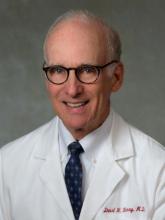H. Jack West, MD, joins the podcast to discuss the latest trials of immunotherapies in the treatment of lung cancer. Dr. West is an associate clinical professor in medical oncology at City of Hope Comprehensive Cancer Center in Duarte, Calif., and a thought leader in thoracic oncology. Dr. West and Blood & Cancer host David H. Henry, MD, of Pennsylvania Hospital, Philadelphia, review Keynote-042, Keynote-189, and IMpower150, and discuss how the findings influence practice.
Plus, in Clinical Correlation, Ilana Yurkiewicz, MD, of Stanford (Calif.) University discusses how to be nonjudgmental when talking to patients about how they got cancer.
* * *
Help us make this podcast better! Please take our short listener survey: https://www.surveymonkey.com/r/podcastsurveyOct2019
* * *
This Week in Oncology
FDA Approves Ziextenzo for neutropenia-related infection reduction
The FDA has approved the biosimilar Ziextenzo to reduce the incidence of infection in patients with nonmyeloid cancer who are receiving suppressive anticancer drugs that are associated with febrile neutropenia.
Treatment for metastatic nonsquamous non–small cell lung cancer (NSCLC) without EGFR mutation or ALK translocation:
- Keynote-042
- Design:
- Pembrolizumab alone vs. chemotherapy alone (carboplatin plus paclitaxel or carboplatin plus pemetrexed)
- 902 patients
- 1:1 randomization
- All patients with at least 1% PDL1 positivity
- Stratified into three groups: greater than 1%, greater than 20%, and greater than 50% PDL1 score
- No crossover permitted between groups
- Results:
- Overall survival is 16.7 months with pembrolizumab vs. 12.1 months with chemotherapy.
- PDL1 score 1% or greater: 16.7 months for pembrolizumab vs. 12.1 months for chemotherapy alone.
- PDL1 score 20% or greater: 17.7 months for pembrolizumab vs. 13.0 months for chemotherapy alone.
- PDL1 score 50% or greater: 20.0 months for pembrolizumab vs. 12.2 months for chemotherapy alone.
- There was no statistically significant difference in progression-free survival.
- Overall survival is 16.7 months with pembrolizumab vs. 12.1 months with chemotherapy.
- Conclusion:
- Pembrolizumab monotherapy can be extended as first-line therapy to patients with locally advanced or metastatic non–small cell lung cancer and a high PDL1 score.
- Pembrolizumab monotherapy alone may not be the best choice for patients with a low PLD1 score.
- Design:
- Keynote-189
- Design:
- Pembrolizumab plus chemotherapy vs. placebo plus chemotherapy (pemetrexed plus platinum agent)
- 616 patients
- 2:1 randomization
- All patients with at least 1% PDL1 positivity
- Crossover to pembrolizumab monotherapy was permitted among the patients in the placebo-combination group who had verified disease progression
- Results:
- Overall survival to 12 months: 69.2% with pembrolizumab plus chemotherapy vs. 49.4% with chemotherapy alone.
- Progression-free survival: 8.8 months with pembrolizumab plus chemotherapy vs. 4.9 months with chemotherapy alone.
- Conclusion:
- Pembrolizumab should be added to standard chemotherapy of pemetrexed and a platinum-based drug for significantly longer overall survival and progression-free survival than chemotherapy alone, regardless of level of PDL1 positivity.
- Design:
- IMpower150
- Design:
- Atezolizumab plus bevacizumab plus carboplatin plus paclitaxel (ABCP) vs. bevacizumab plus carboplatin plus paclitaxel (BCP) vs. atezolizumab plus carboplatin plus paclitaxel (ACP)
- 1,202 patients
- 1:1:1 randomization
- Patients with any PD-L1 immunohistochemistry status were eligible
- Stratified by level of Teff gene-signature expression
- Results:
- Overall survival was longer in the ABCP group than in the BCP group (19.2 months vs. 14.7 months).
- Progression-free survival was longer in the ABCP group than in the BCP group (8.3 months vs. 6.8 months).
- In the Teff-high population, progression-free survival was significantly longer in the ABCP group than in the BCP group (11.3 months vs. 6.8 months).
- Conclusion:
- Addition of atezolizumab to bevacizumab plus chemotherapy significantly improved progression-free survival and overall survival among patients with metastatic nonsquamous NSCLC, regardless of PD-L1 expression.
- Unclear if ABCP regimen is superior to pembrolizumab monotherapy (in greater than 50% PDL1 group) or pembrolizumab plus pemetrexed plus platinum agent (in all PDL1 groups) as a four-drug regimen may be less attractive than these options.
- Teff status has not yet been proven to be useful for clinical decision making.
- Design:
References
Mok TSK et al. Pembrolizumab versus chemotherapy for previously untreated, PD-L1-expressing, locally advanced or metastatic non–small cell lung cancer (KEYNOTE-042): A randomised, open-label, controlled, phase 3 trial. Lancet. 2019;393:1819-30.
Gandhi L et al. Pembrolizumab plus chemotherapy in metastatic non–small cell lung cancer. N Engl J Med. 2018;378:2078-92.
Socinski MA et al. Atezolizumab for first-line treatment of metastatic nonsquamous NSCLC. N Engl J Med. 2018;378:2288-301.
Show notes by Sugandha Landy, MD, resident in the department of internal medicine, University of Pennsylvania, Philadelphia.
For more MDedge Podcasts, go to mdedge.com/podcasts
Email the show: podcasts@mdedge.com
Interact with us on Twitter: @MDedgehemonc
Ilana Yurkiewicz on Twitter: @ilanayurkiewicz

